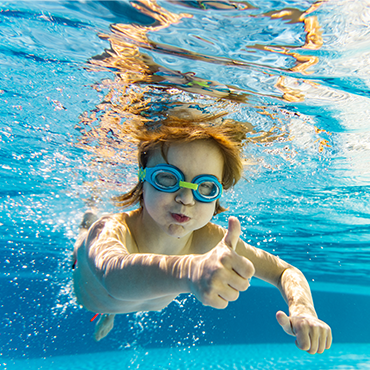As the weather warms up, families may turn to backyard pools and sprinklers as a source of entertainment and will head to local beaches on vacation. It is crucial that parents remember water safety tips and help prevent drowning accidents.
Why is water safety important?
Drowning is the number one cause of injury death in children 1-4 years old. While water safety is important at all ages, toddlers are at especially high risk. They have large heads relative to their body sizes and they are naturally curious about anything and everything. Additionally, toddlers can drown in as little as 1 inch of water.
Water is around us everywhere, especially here in the Pacific NW. But lakes, rivers, and oceans aren’t the only sources of water danger. It’s important to also remember potentially dangerous water sources at home such as bathtubs, toilets, backyard spas and ponds, cleaning pails and buckets, wading pools, coolers with melted ice, large water bowls for pets, and bins that may collect rainwater.
Water Safety Tips
There are several steps parents and caregivers can take to help keep kids safe.
- Water supervision is key. An adult needs to be within arm’s reach, not otherwise distracted by screens/socializing. Additionally, the adult should be CPR-trained.
- Swim where there are lifeguards present.
- Children should wear Coast Guard approved life jackets. Do not rely on not water wings, floaties, or rafts.
- If you have a swimming pool, install 4-sided fencing and gates and make sure children are constantly supervised.
- Empty pails, kiddie pools, and bathtubs after use.
- Keep bathroom and laundry room doors closed.
Teenagers and Water Safety
It is important that teenagers are reminded of water safety as well. Teens ages 15-19 years old have the second highest fatal drowning rate out of any age group. Teenagers are more likely to take risks, overestimate their abilities, and underestimate potentially dangerous situations. They are also more likely to drown in natural bodies of water such as lakes, rivers, and oceans. Be sure to talk to your teen about always entering the water feet first, only swimming in designated swimming areas with lifeguards, always wearing a life jacket when boating, and staying sober, especially around water. And remember, it’s never too late to get your teenager into swim lessons.
CPR Resources
Parents, caregivers, and even teens should learn CPR and water rescue techniques. There are many classes available in the community including those offered through Seattle Children’s Hospital and the American Red Cross. Many classes are currently postponed due to COVID-19, but you can still receive an overview through CPR videos.
For more information:
Dr. Lorena Shih is a pediatrician in the Allegro Pediatrics Redmond office.
Keep Reading
View All Posts
Tips for Navigating Flu Season
Getting a flu vaccine is one of the most effective ways to prevent the spread of influenza and reduce the risk of complications.

Measles FAQs
The MMR vaccine is a safe and effective way to protect against measles. Learn answers to commonly asked questions about measles.

Helping Kids Breathe Easier
By checking asthma control at every well care visit, we can identify changes early and make sure each child has the support they need to breathe comfortably and stay active.

